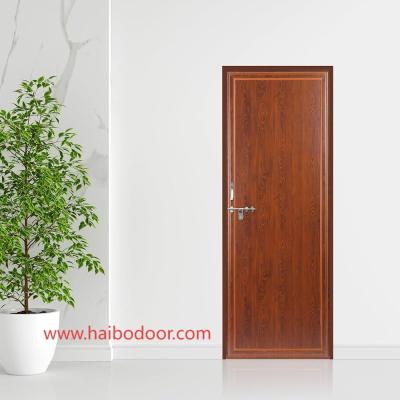-
In today’s interior design landscape, homeowners and developers alike seek practical yet personalized solutions. That’s where the PVC Door Factory comes into play—not just as a place of production, but as a hub of customization. From the initial idea to the final delivery, PVC door manufacturers have built systems that cater to a wide range of preferences, ensuring each door fits both space and style.
1. Starting with the Right Material
PVC has become a go-to material for interior doors thanks to its durability, water resistance, and low maintenance. A good PVC door factory begins by selecting high-quality raw PVC sheets, often reinforced with a composite core or honeycomb paper, depending on the usage scenario.
Modern factories don't just buy bulk materials—they source them with design flexibility in mind. This ensures the doors are not only functional but also capable of supporting a wide range of finishes, from wood grain textures to sleek matte tones.
2. The Role of Technology in Customization
What truly sets a modern PVC door factory apart is its investment in digital and automated production tools. Computer-aided design (CAD) systems allow customers to submit door specifications in detail—exact dimensions, panel layouts, cut-outs for glass, grooves, even patterns and colors.
From there, CNC machinery takes over. These high-precision tools cut and engrave the door surfaces based on the customer’s design, ensuring a perfect match between concept and outcome. The automation doesn’t stop at cutting. Even lamination or transfer printing of finishes is done using pressure-controlled systems for consistent appearance.
3. Style Meets Function
While the structure of a PVC door ensures stability and weather resistance, the customization options are what truly resonate with buyers. Leading PVC door factories offer a catalog of design elements:
Choice of skin (e.g., melamine, PVC foil, PU coating)
Custom edge bands and frame profiles
Optional additions like vision panels or sound insulation layers
Even door thickness can be customized, helping buyers create lightweight solutions for wardrobes or denser options for improved soundproofing in offices or bedrooms.
4. Small Batch, Big Flexibility
One of the misconceptions about customization is that it only applies to bulk orders. However, many PVC door factories now support small-batch production, especially as demand for personalized interiors grows in urban apartments and boutique hospitality projects.
The ability to switch design formats quickly, thanks to digital tools and modular workflows, allows even small orders to be fulfilled efficiently—without compromising on quality.
5. From Factory Floor to Finished Frame
Once production is complete, quality control teams inspect doors for alignment, surface consistency, and structural integrity. Packaging is also part of the experience: foam-corner protection, reinforced cartons, and optional branding all contribute to a professional finish.
Whether you're designing a new space or replacing old doors, working with a PVC door factory that values customization is key. The process is no longer rigid or limited—factories today are as much about creativity as they are about consistency. If you're looking for reliable design and flexible production, https://www.haibodoor.com/news/industry-news/how-a-pvc-door-factory-creates-quality-and-design-for-everyday-living.html offers expertise that blends precision with personalization.
